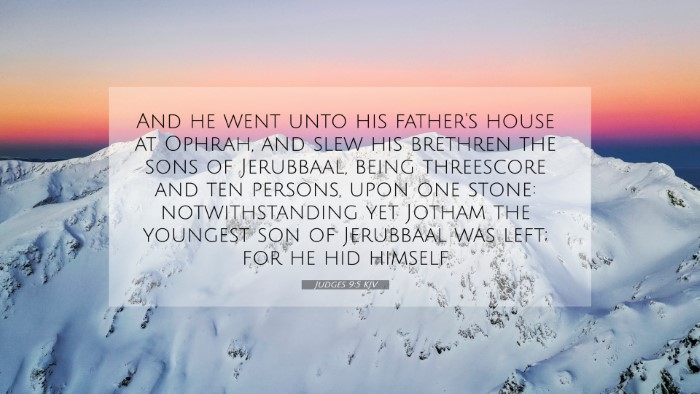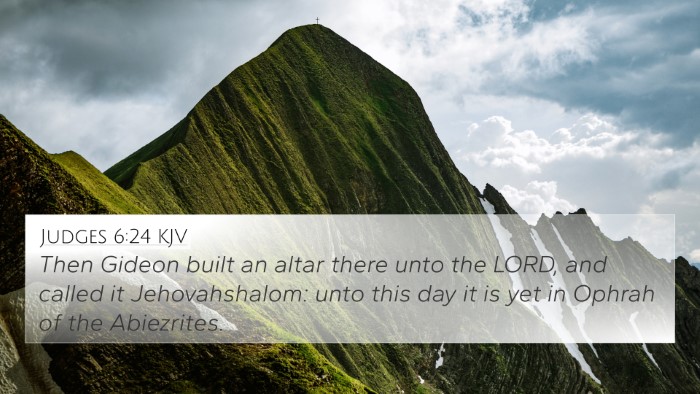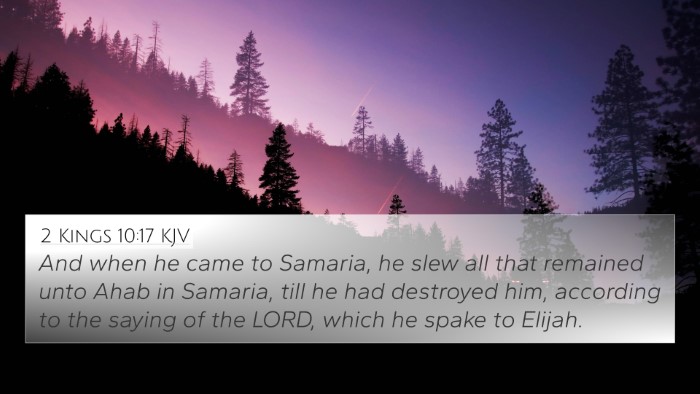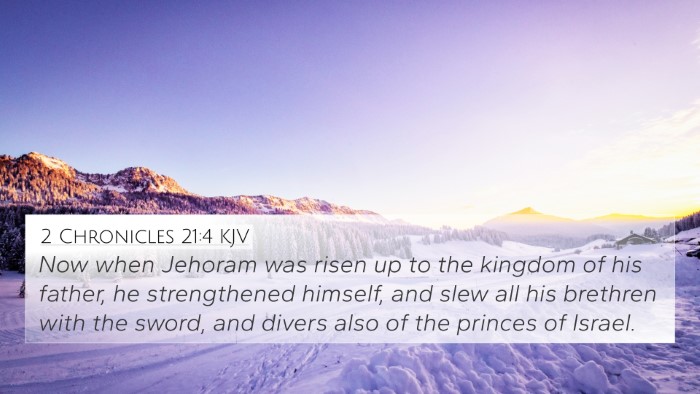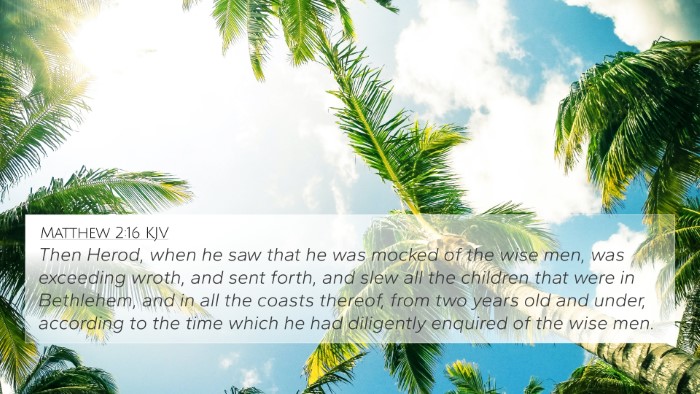Understanding Judges 9:5
Judges 9:5 states:
"And he went unto his father's house at Ophrah, and slew his brethren the sons of Jerubbaal, being threescore and ten persons, upon one stone: notwithstanding yet Jotham the youngest son of Jerubbaal was left; for he hid himself."
Meaning and Interpretation
The events of Judges 9:5 are pivotal in the narrative of the Book of Judges. This verse details the treachery of Abimelech, the illegitimate son of Gideon (also known as Jerubbaal), who seeks power by murdering his own brothers. The gruesome act underscores themes of ambition, betrayal, and the consequences of leadership.
Key Insights from Commentaries
- Matthew Henry: Henry emphasizes the brutal nature of Abimelech's actions, highlighting the moral degradation that can arise from a pursuit of power. He interprets this violence as indicative of the chaos that ensued after Gideon's death, suggesting a breakdown of familial bonds and community trust.
- Albert Barnes: Barnes notes that Abimelech's slaughter of his brothers was a calculated move to eliminate any threat to his claim to leadership. He draws parallels to other historical and biblical figures who resorted to violence to secure their position.
- Adam Clarke: Clarke provides a narrative analysis, pointing out that Jotham, the youngest brother who escaped, serves as a remnant of Gideon's lineage and a potential focal point for future hope. His survival symbolizes that evil acts do not extinguish the possibility of righteousness.
Thematic Connections
Judges 9:5 can be seen as part of a larger theme within the Bible that concerns leadership, legitimacy, and the consequences of violent actions. Several verses can be cross-referenced to enhance understanding:
- 1 Samuel 15:23: "For rebellion is as the sin of witchcraft..." – highlights the rebellion against God's order, akin to Abimelech's actions.
- Psalm 37:1: "Fret not thyself because of evildoers..." – a reassurance amidst the turmoil of betrayal and wickedness.
- Matthew 23:37: "O Jerusalem, Jerusalem, thou that killest the prophets..." – illustrates a historical pattern of violence against divine messengers.
- Hebrews 11:34: "...out of weakness were made strong..." – reflects the survival of Jotham as a metaphor for hope amid despair.
- Genesis 4:8: Cain's murder of Abel serves as a foundational narrative about fratricide and its repercussions, analogous to Abimelech's betrayal.
- Proverbs 28:16: "The prince that wanteth understanding is also a great oppressor..." – commenting on how the lack of integrity leads to oppression.
- Galatians 5:15: "But if ye bite and devour one another..." – indicates the dangers of internal conflict, reflective of Abimelech’s actions.
- Ephesians 6:12: "For we wrestle not against flesh and blood..." – reminding believers that their battles often extend beyond physical confrontations.
- Luke 14:28: "For which of you, intending to build a tower..." – a verse about counting the cost, relevant to the repercussions of leadership decisions.
- Revelation 6:10: "How long, O Lord..." – expressing the cries of the oppressed and the judgment of wickedness that resonates through history.
Cross-Referencing Biblical Texts
In study and understanding of the biblical text, cross-referencing serves as a valuable tool. Here are some methods to explore interconnections among scripture:
- Tools for Bible Cross-Referencing: Use a Bible concordance to find related verses based on keywords or themes.
- Bible Cross-Reference Guide: Various editions of the Bible include cross-references in the margins, making it easier to find related passages.
- Cross-reference Bible study: Grouping verses thematically can provide deeper insights into a particular subject within scripture.
- How to Use Bible Cross-References: Focus on the context of each verse to draw meaningful connections.
- Bible Cross-Reference System: Study verses systematically to uncover layers of meaning through comparative analysis.
- Comprehensive Bible Cross-Reference Materials: Utilize study Bibles or commentaries that provide extensive cross-referencing.
- Cross-Referencing Bible Study Methods: Engage in group studies or discussions focused on the connections within chosen verses.
- Bible Chain References: Follow a chain of verses that relate to a particular theme or topic for a holistic understanding.
Conclusion
Judges 9:5 stands as a stark reminder of the potential for moral decay in the pursuit of power. By examining cross-references, we gain insight into how this narrative intertwines with larger biblical themes of sin, redemption, and the complexity of human nature. Understanding these connections can significantly enhance one’s spiritual journey and understanding of the Scriptures.
For anyone looking to delve deeper into biblical studies, leveraging tools for cross-referencing will enrich their exploration and comprehension of the multifaceted themes within God's Word.


